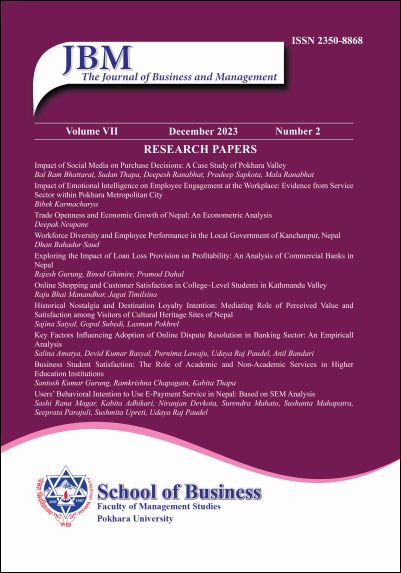Impact of Emotional Intelligence on Employee Engagement at the Workplace: Evidence from Service Sector within Pokhara Metropolitan City
DOI:
https://doi.org/10.3126/jbm.v7i02.62584Keywords:
Confirmatory factor analysis, emotional intelligence, employee engagement, structural equation modelingAbstract
Background: In the dynamic landscape of the service sector, the management of a diverse workforce with varying emotions and motivations presents a compelling challenge. Within this context, unraveling the intricacies of emotional intelligence assumes paramount significance. Understanding the factors that influence emotional intelligence and its subsequent impact on employee engagement is crucial for cultivating a positive work environment and augmenting overall organizational effectiveness.
Objectives: The objective of this study is to analyze the impact of various dimensions of emotional intelligence on employee engagement at the workplace in various service sectors in Pokhara metropolitan city.
Methods: The study utilized a causal comparative research design with a sample of 350 employees from the service sector in Pokhara. Purposive sampling was employed, and structured questionnaires were used for data collection. The analysis included Confirmatory Factor Analysis (CFA) and Path Analysis to explore causal relationships between emotional intelligence dimensions and employee engagement levels.
Results:The result of Confirmatory Factor Analysis showed a good fit with model fit indices as χ2/df =1.231, GFI=0.944, AGFI=0.931, RMSEA= 0.024, CFI=0.901, TLI=0.887. The result of Path Analysis revealed that there is a significant positive impact of all emotional intelligence dimensions on employee engagement, explaining 61% of the variance in the Nepalese service sector.
Conclusion: The research highlights the positive relationship between emotional intelligence and employee engagement in the service sector in Pokhara, emphasizing the importance of fostering emotional intelligence competencies for organizational success. Organizations should invest in targeted interventions and training programs to enhance emotional intelligence among employees, aiming to improve their well-being, job satisfaction, and overall performance, thereby cultivating a highly engaged workforce.
Downloads
Downloads
Published
How to Cite
Issue
Section
License
Copyright © the School of Business. All rights reserved. No part of this volume may be reproduced or utilized in any form or by any means, electronic or mechanical, including photocopying, recording, or by and information storage and retrieval system, without permission in writing from the publisher.




